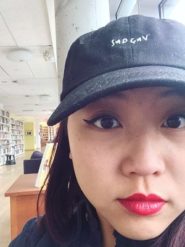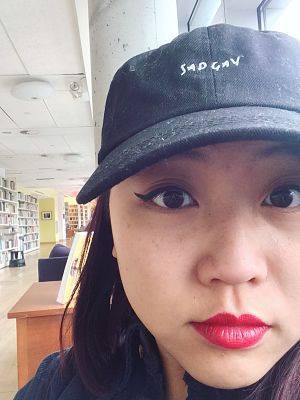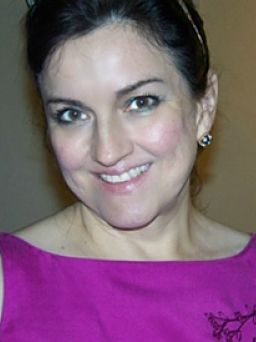Litdish: Jody Chan, Poet
 Jody Chan is a writer and organizer based in Tkaronto/Toronto. They are the poetry editor for Hematopoeisis, a 2017 VONA alum, and the 2018 winner of the Third Coast Poetry Contest, selected by Sarah Kay. Their first chapbook is forthcoming in 2018 with Damaged Goods Press, and their poetry is published in BOAAT, Looseleaf Magazine, Nat. Brut, The Shade Journal, and elsewhere. They can be found online at https://www.jodychan.com/ and offline in bookstores or dog parks.
Jody Chan is a writer and organizer based in Tkaronto/Toronto. They are the poetry editor for Hematopoeisis, a 2017 VONA alum, and the 2018 winner of the Third Coast Poetry Contest, selected by Sarah Kay. Their first chapbook is forthcoming in 2018 with Damaged Goods Press, and their poetry is published in BOAAT, Looseleaf Magazine, Nat. Brut, The Shade Journal, and elsewhere. They can be found online at https://www.jodychan.com/ and offline in bookstores or dog parks.
1. Tell us a little about your writing process—how often you write, what your desk is like, etc. Do you still write in longhand? Quiet? Music?
I write in snatches: while riding the subway, in my head while biking (this is sometimes dangerous), during my lunch break at work, on my phone in the washroom. Everything my senses run into is a potential prompt—and then the ideas get captured in an ever-growing stash of phone notes. It doesn’t work for me to set goals for frequency, like writing every day or even every other day. It makes me beat up on myself too hard when I don’t meet my own goal, and then writing becomes a guilty obligation instead of something I get to look forward to.
2. Do you consider yourself classically trained? Are you influenced by a certain group of poets? Language poets in particular?
My writing education has come from attending workshops with VONA, The Speakeasy Project, and Winter Tangerine; I have been most heavily influenced by those teachers (Danez Smith, Luther Hughes, Yasmin Belkhyr, jayy dodd) whose lessons I carry with me into every poem. My work also looks to queer poets of colour like Franny Choi, Chen Chen, Angel Nafis, Hieu Minh Nguyen, Natalie Diaz, and Fatimah Asghar who address themes of intergenerational trauma, queer identity, and queer joy. My writing often wrestles with questions about language—its openings, its limitations, how it can be used as an instrument to create meaning. Sometimes, though, I do want language to take an unobtrusive backseat to the image or the narrative in my poems.
3. You experiment quite a bit in your writing (I absolutely love the new addition to your website— “Superstitions”) using Chinese characters and composition by field. Why? Do you gain freedom of expression this way?
I usually make choices about form based on each individual poem, and what I think would serve the content best. In the case of “superstitions,” I wanted the form to convey the breathless, weighty accumulation of beliefs and exhortations that I have received from my family. Using punctuation would have given me, and the reader, too much space to rest, and time to filter these received superstitions through a lens of “common sense” or judgment. I use Chinese characters in many of my poems as an active refusal to translate for a white audience; when I use phonetic translations of spoken Cantonese, I don’t italicize them for the same reason. My poems often speak directly to people (my mother, most frequently) with whom I would naturally use Cantonese to communicate. This is all complicated by the fact that Cantonese is a language I don’t know how to read very well, and can’t write at all—which means that I myself was only able to get there through Google Translator. I know a lot of diasporic kids, like me, who feel shame about not knowing their own language; so in some ways, my poetic choices are a defense against my own shame as well.
4. What do you consider to be a “good day of writing” in your world?
The meaning of a “good day of writing” depends on what I’m working on at the time. With some poems, a whole draft might emerge in one sitting. Others struggle much harder and more slowly, in which case unearthing a single solid line or image might feel really good. There are other activities—like reading a new book of poetry, or adding words to my word bank, or listening to a podcast interview of a brilliant poet—that I consider poetic exercising, and can define amazing writing days on their own.
5. What does your editing process look like? Are you part of a writer’s group? Do you workshop pieces with trusted friends…etc?
I have a few trusty editing exercises that I put all my pieces through. For example, I circle all the verbs in one colour and all the nouns in another, to make sure each one is pulling its weight. I read it out loud, and cut one quarter of the lines. I tend to hold onto all my drafts in the same document, so I can see how the poem has evolved over time. My baby first drafts go to my writing group, which is made up of two trusted friends. We meet monthly to workshop pieces across the genres of fiction, poetry, and non-fiction. Our feedback does focus on craft, but it is also holistic and human: we celebrate each other’s achievements and lift each other up.
6. Inspiration? What inspires you to pick up your pen?
One of the main engines of my work is obsession. I find it difficult to write when I am not actively obsessed with something—which, thankfully, isn’t very often (as my browser tabs can attest). Once, I spent two hours watching a giant Pacific octopus breathe in the corner of its tank at the Seattle Aquarium for a poem about parenting and captivity. Once, I dug up twenty-year-old Internet forums speculating on the cause of death for Teresa Teng, a beloved Taiwanese singer—conversations that ended up informing a series of poems about her life and personal and political impact. I’ve found that my obsessions are ways into talking about the themes that propel my work: sickness and sexuality, trauma and joy, family and community.
7. What would you like for your poetry to accomplish?
I believe that all art is political. I have a responsibility as an artist to continually orient my work in relationship with movements fighting for justice. I want my voice to weave together my mother tongue (English) and my mother’s tongue (Cantonese), to weave spells of care and safety for my blood and chosen kin, who are the people I want my work to have meaning for. I think every poem can have a different purpose: sometimes, a poem wants to be angry, smash windows. Sometimes, it wants to be a deep breath of refuge in between bouts of yelling and chanting at rallies to denounce a racist, colonial government. Other times, a poem is a crystallized moment of joy between friends at a dance party. But I hope for all of my poems to be in service of my people.
8. How important is language to an aspiring poet? What are your words of encouragement to someone who is learning to write?
I’ll only speak for myself, but I think that I’m a poet because I believe in the power of language: what it can do for us, between us. And that includes both violence and healing. At the end of the day, I also love language and try not to take it for granted. I have fun seeing what rules I can subvert. The advice I want to pass on is advice that I’ve received, over and over, from some of my own teachers: you have to let go of your expectations, let go of the (capitalist, ableist) pressure to produce something every time you sit down to write. Just write. A lot of us are always thinking about the people or communities we’re writing for. This shift was life-changing for me. I don’t write about things that don’t matter to me, and that can feel weighty enough, without also demanding that my every attempt at art goes somewhere, or that it always be intentional.
9. How often do you venture out to writing circles/readings? How important is it for poets to be part of a writing community?
I never go to as many in-person writing circles or readings as I think I should. I tend to cultivate writing community in a less organized way, but there’s no such thing as art in isolation; I wouldn’t be able to do any of my work without my ties to community. My people are the ones I write for, and they’re the ones who take care of me so I can write. I’ve also been amazingly lucky to build relationships with so many folks through online and offline writing workshops like VONA and Winter Tangerine—many of whom don’t live anywhere near me, but who continue to support and love on each other’s work constantly.
10. How do sensitive issues make themselves known in your work? Your poem “Telling my Mother I’m not Her Daughter” is excruciatingly beautiful… “meaning sometimes I want to be a wall / & sometimes a pillow / 阿媽 / do you understand? / I do not want to be a woman / because I am not / a woman / hold up a mirror / every time / your body / dismantles / its own shell / & finds / the imprint / of an invisible yoke / 媽 / I burrow these questions / through my skin /” These issues are not for the faint of heart…but there they are, twinkling like stars between the lines…. How do you do this?
Thank you for saying that! I don’t think I make conscious decisions to pursue “sensitive issues,” per se. I just don’t shy away from the aspects that make us whole people with complicated relationships. Everything worth writing about is at least a little bit scary; there’s always risk involved in naming something true. I often think through writing. There are things I’ve written about that I never articulated before they came out in a poem, and then I came to understand my own feelings, or a new perspective on a familiar wound, through the poem. I think the bigger challenge is navigating the line between what feels like exploiting trauma (mine, others’) for artistic credibility with white audiences, and what feels more like being honest about experiences of pain and oppression. At those times, I think about the fact that I am both an individual and part of a collective, and thus hold part of a collective responsibility for the people around me. How can I write about shared trauma and grief in a way that heals, or bears witness, without doing further harm to my communities?


 Janet Rodriguez is an author, blogger, teacher, and editor living in Sacramento with her husband, extended family, three dogs, and one cat. In the United States, her work has appeared in Salon, American River Review, Greensleeves, Calaveras Station, and Sacramento Family Resource Guide. Rodriguez has also had essays, stories and two biographies published in South Africa.
Janet Rodriguez is an author, blogger, teacher, and editor living in Sacramento with her husband, extended family, three dogs, and one cat. In the United States, her work has appeared in Salon, American River Review, Greensleeves, Calaveras Station, and Sacramento Family Resource Guide. Rodriguez has also had essays, stories and two biographies published in South Africa.


